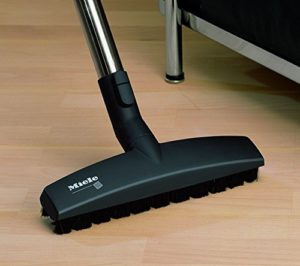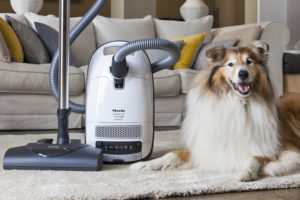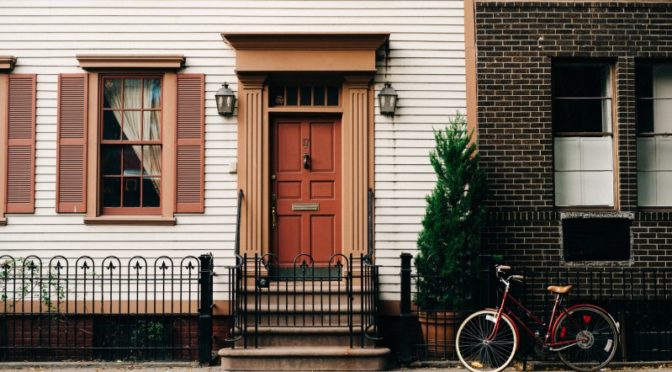
If you’re in the market for a bare floor, you’ve probably heard of hardwood, engineered wood, ceramic and porcelain tiles, and vinyl and laminate. These are common enough choices, and most homeowners eventually choose one of those materials if they don’t want carpets. But every now and then, concrete comes up as an alternative. And while you’ve doubtless seen concrete in basements, on sidewalks, and throughout commercial buildings, you might not have considered it as a residential flooring option. Today we’re going to look at the benefits and drawbacks of residential concrete floors to help you decide if their advantages outweigh their disadvantages for your lifestyle.
Concrete is about as durable as flooring gets

If you’re looking for a floor that won’t break down under pressure, concrete is about as good as it gets. There’s a reason it’s used on roads and in factory floors; you’re not going to drive an eighteen wheeler over hardwood, but you can easily do so over concrete.
The high levels of resiliency and durability of concrete flooring also makes it hard to seriously damage. Pets can scratch all day long and won’t mar the surface; you can drag dozens of furniture legs across it and it’ll look the way it did when you bought it. Even high heels won’t snag or tear it. Similarly, most of the things you drop on concrete won’t harm it (although we can’t say the same for the things themselves). While you can chip concrete, it’s not easy.
However, concrete requires bi-annual maintenance and is moisture-prone

That said, concrete is sensitive to moisture; to keep it out, you’ll need to either seal or wax it every six months on average so it keeps its protective layer. While most people don’t do so with residential concrete, such as that used for garage and basement floors, it’s considered best practices if you want your concrete to last for decades.
If you don’t seal your concrete thoroughly both above and below, moisture can enter from either end. And if water does enter a concrete floor’s pores, it can lead to mold or mildew growth. Large amounts of water, of course, can freeze and crack your concrete; in the worst case scenarios, your floor slab might end up in need of repair, which is serious, because it’s what holds your house up on each floor.
Concrete is versatile and environmentally friendly

On the positive end, as long as you keep your concrete in good condition (i.e., away from water), it’s one of the most versatile surfaces on the market, as you can cover it with just about any other floor surface, from bare floors to carpets. The reason for this is because most homes are built with concrete subfloors.
This also makes concrete one of the most environmentally friendly choices for flooring, as you can often “install” a concrete floor simply by removing whatever bare or carpeted floor was installed on top of the concrete to begin with. You aren’t using any new materials to make a concrete floor in such situations, which means you don’t have an additional carbon footprint to worry about.
However, it’s also dangerously hard, uncomfortable, and cold

That said, not everything about concrete is positive. The most obvious disadvantage is tied to its primary advantage: concrete is very, very hard. Many would call it dangerously hard; you face a high risk of injury if you fall on a concrete floor. The odds are several times higher than your odds of injury when falling on carpet and significantly higher than your odds of injury on hardwood flooring.

Similarly, if you drop things on concrete (e.g., dishware, a laptop, a smart phone), you’re much more likely to break them than you would dropping them onto a softer surface. As a result, if you have children or aging parents and relatives, concrete is not going to be a good choice, as these populations are far more likely to fall than adolescents and adults in their 20s-50s. It’s even harder than tile flooring, which is no small feat.
Leaving aside the safety risk, concrete simply isn’t a comfortable floor; you’re never going to hear someone say they slept for hours on concrete when only meaning to rest for a minute, because no one willingly rests on concrete. It’s difficult to stand on as well for long periods of time, and you’re going to end up with aching feet if you try.
Finally, concrete is not a good insulator of heat. Once again, it resembles ceramic and porcelain tiles in that you’re going to feel cold if you step on concrete during fall, winter, or spring. As with the lack of comfort, you can ameliorate these effects to some degree by using area rugs, but if you find yourself wanting to install area rugs everywhere, it might be a sign that you’d be better suited with a softer floor.
If you choose a concrete floor, which vacuums will clean it best?

While you can technically use any vacuum to clean a concrete floor, we tend to recommend buying vacuums that will work for both bare floors and carpeted floors, as few homeowners (and even fewer people living with children or the elderly) are willing to have a home full of concrete and devoid of soft flooring.

Ideally, you’ll want a vacuum with a Parquet head to polish and efficiently clean bare floors (including concrete) and a powered brush head to effectively deal with carpeting. Two vacuums that can handle both tasks and include both heads include the Miele Complete C3 Cat & Dog (reviewed here and here) and Miele Compact C2 Electro+ (reviewed here and here).
![]() You can buy the Miele Complete C3 Cat & Dog here on Amazon or buy the Miele Compact C2 Electro+ here.
You can buy the Miele Complete C3 Cat & Dog here on Amazon or buy the Miele Compact C2 Electro+ here.
![]() Canadians can buy the Miele C3 Cat & Dog here or buy the Compact Electro+ here.
Canadians can buy the Miele C3 Cat & Dog here or buy the Compact Electro+ here.
 If you find our research on PMC helpful, you can follow our efforts to keep maniacally reviewing home cleaning tools by shopping through our links above. We promise to keep fighting the good fight against every horror children, animals, and grown, yet messy humans can inflict upon a clean home.
If you find our research on PMC helpful, you can follow our efforts to keep maniacally reviewing home cleaning tools by shopping through our links above. We promise to keep fighting the good fight against every horror children, animals, and grown, yet messy humans can inflict upon a clean home.

